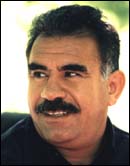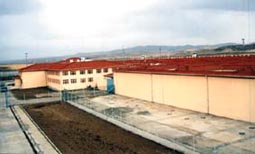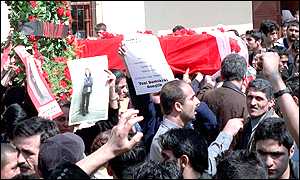28
September 2001
![]()
2. "Turkey hunger strike toll hits 39 as two women protestors die", a nearly one-year-old hunger strike against disputed reforms in Turkish jails has claimed two more lives, bringing the death toll to 39, sources close to the strikers told AFP on Friday.
3. "Turkey, sole Muslim member of NATO, vows support for US anti-terror drive", Turkey, the only Muslim nation in NATO, pledged its full support for a US-led anti-terrorism campaign on Thursday as Turkish Foreign Minister Ismail Cem met Secretary of State Colin Powell.
4. "Ocalan case in European Human Rights Court", Lidell, Secretary in charge of Press of European Human Rights Court, stated that there would be some attempts for an investigation before the verdict on Ocalan case.
5. "Will EU stance change?", columnist Sami Kohen comments on the recent attacks and their potential consequences.
6. "Turkish Kurd MP to publish poems in Kurdish after language reform", a Kurdish-origin deputy in the Turkish parliament was preparing to publish his poems in Kurdish once lawmakers adopt a series of constitutional reforms which could allow Kurdish to be used in broadcasting and publication, a Turkish newspaper reported Friday.
1. - Frankfurter Rundschau - "Turkey sticks to death penalty despite constitutional reform":
Condemned PKK party leader Abdullah Ocalan faces execution
ATHENS / by Gerd Hoehler 
Turkey apparently does not intend to meet the demand from the European
Union and the Council of Europe for a general abolition of the death
penalty. On Thursday, the parliamentary committee responsible for change
approved an amendment to the constitution that merely restricts capital
punishment.
But even if parliament agrees to the draft amendment - and this is expected to happen before the end of this month - the death penalty could still be imposed in times of war or an immediate threat of war and for "terrorist activities". Thus, Abdullah Ocalan, leader of the Kurdistan Workers' Party (PKK), still faces execution. His death sentence was the main reason for placing capital punishment on the agenda.
The Turkish parliament, which has to expressly approve the carrying-out of death sentences under the constitution, has not authorised an execution since 1994. Currently, 116 prisoners sentenced to death - besides Ocalan - are in Turkish prisons, many of them on terrorist charges.
The planned constitutional amendment originally proposed that the death penalty would be kept in place for "acts of terror". The obviously vague wording "terrorist activities" was chosen under pressure from right-wing extremists in the Nationalist Movement Party (MHP), a member of the current government. According to the expected amendment, the legislature will have to determine in detail - by means of changes to penal and anti-terror laws - precisely what offences will carry the death penalty.
The constitutional reform now being discussed in parliament, with which Ankara hopes to fulfill the criteria for convergence with the EU, also lags behind Europe's expectations in the issue of bans on the Kurdish language.
Although the ban on Kurdish in the mass media is supposed
to be eased, broadcasts which are directed against "the foundations
of the state, public order, the country's territorial and national integrity
and the national security" will be banned, according to the constitutional
amendment just approved by the parliamentary committee. In practice,
this offers every means of taking action against critical Kurdish mass
media. ![]()
2. - AFP - "Turkey hunger strike toll hits 39 as two women protestors die":
ANKARA
A nearly one-year-old hunger strike against disputed reforms in
Turkish jails has claimed two more lives, bringing the death toll to
39, sources close to the strikers told AFP on Friday. Two women protestors
died late on Thursday in a house in Ankara's Mamak district, where far-left
activists have been fasting in solidarity with hunger-striking inmates,
said an activist taking care of the strikers in the house.
Ayse Bastimur, a 34-year-old former inmate, perished on
the 342nd day of her fast-to-death, while Ozlem Durakcan, 19, died 74
days after joining the movement, which began last October against the
introduction of new jails with tighter security. Two other protestors
had died earlier on Thursday in a similar house occupied by outside
supporters of the strike in Istanbul.
The strikers, backed by a number of civic groups, say the new jails,
where cells for three people at most replaced dormitories housing dozens,
will deepen social alientaion among prisoners and leave them more vulnerable
to maltreatment. The toll includes both prisoners and associates fasting
in solidarity outside prisons. Another participant in the protest, a
far-left inmate, died last week in an Istanbul hospital from burns after
setting himself ablaze to denounce a police crackdown on a funeral procession
for a hunger strike victim.
On September 10, a suicide bomber protesting the new jails
blew himself up in downtown Istanbul, also killing two policemen and
an Australian tourist and injuring about 20 people. The main architect
of the hunger strike, the far-left underground People's Liberation Party-Front
(DHKP-C), claimed responsibility for the attack. The Ankara government
rules out a return to the dormitory system on the grounds that packed
compounds were the main factor behind frequent riots and hostage-taking
incidents in its unruly prisons. ![]()
3. - AFP - "Turkey, sole Muslim member of NATO, vows support for US anti-terror drive":
WASHINGTON
Turkey, the only Muslim nation in NATO, pledged its full support
for a US-led anti-terrorism campaign on Thursday as Turkish Foreign
Minister Ismail Cem met Secretary of State Colin Powell.
"We are together with the United States in this fight
against terrorists," Cem told reporters after the meeting, stressing,
however, that the struggle should not target at any one religion or
location .
.
"Terrorism does not have a religion," he said, apparently
seeking to defuse fears that US plans to retaliate for the September
11 attacks in New York and Washington could become an anti-Muslim or
anti-Arab campaign. It "is complete nonsense to call one or the
other of terrorists organizations referring to Muslims or to Islamic
terrorism or to Jewish terrorism or to Christian terrorists," Cem
said.
"Terrorism does not have a geography," he added, noting the presence of extremist violence across the globe. "We should, in our fight against terrorists, we should always see that it's a global problem, with which we have to deal in all geographies, in all continents, without any discrimination and with total solidarity." Turkey has said that its airspace and airports will be at the disposal of US transport planes if necessary and that Ankara will supply Washington with intelligence on Afghanistan, the likely first target of any attack.
Turkey's Incirlik base in the south of the country is already home to US and British aircraft enforcing a no-fly zone over northern Iraq. But Turkish Prime Minister Bulent Ecevit has warned against sending ground troops to Afghanistan and a possibly protracted military operation in the country, which is accused of harboring wanted terrorist Osama bin Laden, Washington's prime suspect in the attacks.
Powell expressed his gratitude for the support Turkey had thus far offered, including the overflight permission as well as its backing within NATO and the United Nations for measures aimed at ending global terrorism.
"We do have a strong relationship with Turkey and
I know that in the days ahead, as our campaign against terrorism unfolds,
we will be able to count on the support and active assistance of our
Turkish friends," Powell said. ![]()
4. - Kurdish Observer - "Ocalan case in European Human Rights Court":
Lidell, Secretary in charge of Press of European Human Rights Court, stated that there would be some attempts for an investigation before the verdict on Ocalan case
HUSEYIN ELMALI 
Redrick Lidell, special secretary in charge of press of European
Human Rights Court (EHRC), said, "EHRC gave a period to both sides
of the case in order to prepare their claims and defences within the
framework of articles 2, 3, 5, 6, 7, 8, 9, 10, 13, 14, 18 and 34 of
European Human Rights Accord. Upon the demand of Mr. Ocalan this period
was extended. This additional period will be over on September 28, 2001."
Liddle commented on the new process of the case, "A departmant
of the Court will make investigations and studies on the legal principles
of the case before the last verdict."
The Secretary stated regarding the appropriation of some defence dossiers in Imrali, "If there is such an incident, EHRC judges will take it into consideration."
Lidell continued to relay the following information: "EHRC judges begin investigation within the demands of both sides and information came to them. Then they will decide upon on new hearing or give verdict on the case directly."
A different procedure may be applied
Stating that the decision about a new hearing is dependent on the arguments of both sides and bylaw of EHRC, Lidell added, "Every case has its own peculiarities, an unusual procedure may come into the agenda."
The decision delayed until the next year
A lawyer who does not want to give his name responded to a question "When will the decision be made?" as "I don't think at the end of this year but it is possible within the next spring."
Kurds are preparing for demonstrations
Kurds will make demonstrations in Strasbourg on September 28, the date of the case. The meeting, organized under the name of "Being a United Whole With the National President" will be held in Place Kleber between 1.00 and 5.00 p.m. The organization committee made a statement, saying "Everybody should make action for our national leader at a point in time at which all eyes are on Imrali and Strasbourg, and all sensitive friends, patriots and revolutionaries should prove themselves by action."
South France will be on action too
Kurdistanis living in South France will take part in demonstrations
in order to support PKK President Ocalan on September 28. Kurds are
reported to march with torches in Marseilles, Bordeaux and Lyon on that
day. The demonstrations will take place in front of Reform Church in
Marseilles, in Place Teraux in Lyon and in Place Victoir in Bordeaux.
Yet another demonstration will take place in front of Austrian parliament
at 4.00 p.m. ![]()
5. - Milliyet - "Will EU stance change?":
Columnist Sami Kohen comments on the recent attacks
and their potential consequences. A summary of his column is as follows:
"In the speeches delivered in Ankara following the terrorist
attacks on the US, it was stated that Turkey's importance had grown
in the eyes of the world and this would positively affect the relations
with the EU. It is true that the importance of Turkey's geo-strategic
location and the role she can play under these new circumstances have
increased significantly. However, it would be highly optimistic to suggest
that the view of the Europeans towards Turkey will change. The predominant
view in Brussels, the capital of the EU, is that Turkey's integration
should not be connected to the terrorism issue as encountered today.
The opinion of a EU diplomat who knows Turkey closely should make us pause and think. "There can be no change in the EU criteria for membership. Therefore, it should not be expected that the recent incidents would lead to the acceleration of Turkey's EU membership. The determining factor on the issue will be the enacting of the amendments to the Constitution and accepting reforms as soon as possible, and implementing the National Programme."
Another EU official stated that Turkey's geo-strategic location has achieved an importance in the political evaluation of the US, but it would not be considered as important by the EU. However, the EU is aware of the increased significance of democratic, secular and modern Turkey under these circumstances and hopes that she will set an example for other Islamic countries.
It may be thought that the European Army (European Security and Defence Policy) project may lean more towards Turkey's favour in the wake of the the recent incidents. However it is apparent that the issue is deadlocked. The differences of opinion between Turkey and the EU are not eradicated and the EU is determined to carry out this project at the beginning of the new year. In a joint NATO-EU meeting the Turkish side reiterated their views and stressing the integrity of security stated that the recent incidents should change the old concepts in the EU. However, the speeches of the EU representatives displayed that there was no such change.
Turkish officials, in their recent statements complained
of the lax and even encouraging stances of Europeans on terrorism and
expressed their hope that the European allies would be more understanding
and sensitive towards the activities taking place in their countries
against Turkey. The US officials noted that a more effective dialogue
could be started with Turkey on combating terrorism and Turkey could
more actively contribute to the issue. A EU diplomat said, "Such
a cooperation could provide a new opportunity for Turkish-EU rapprochement."
![]()
6. - AFP - "Turkish Kurd MP to publish poems in Kurdish after language reform":
ANKARA
A Kurdish-origin deputy in the Turkish parliament was preparing to publish his poems in Kurdish once lawmakers adopt a series of constitutional reforms which could allow Kurdish to be used in broadcasting and publication, a Turkish newspaper reported Friday.
Sebgetullah Seydaoglu from the centre-right Motherland Party told the mass-circulation Hurriyet daily that the book of poems, "The Euphrates and the Tigris," had already been published in Turkish two weeks ago. The MP from Diyarbakir, the regional capital of the mainly Kurdish southeast, added that 10,000 copies of the book in Kurdish had been printed ready to be published after the language reform.
"I decided to delay the publication because putting a book of Kurdish-language poems on the market without the reform could have caused trouble," Seydaoglu, 46, told Hurriyet. He said that he was also writing a book entitled "Mesopotamia" about the Kurdish conflict in Turkey's southeast and would publish it in both Turkish and Kurdish.
Legally, the Kurdish language is banned in Turkey, but lawmakers on Tuesday adopted a constitutional amendment which could allow Kurds to use their mother tongue in the media. The article -- part of a reform package to help Turkey catch up with EU norms -- lifts a ban on using forbidden languages in the expression and dissemination of thought, but nonetheless introduces some restrictions.
It stipulates that the right to use any language can be
restricted in order to "protect national security, public order
and safety, the fundamental principles of the Republic, and the indivisible
unity of the state and nation." The article will come into force
when legislators approve the entire refom package in a final vote. ![]()